 Australian
guitarist / keyboardist / composer / vocalist Ben Craven continues
on a mission to bring his music to the ears of progressive rock audiences
far and wide. Progressive rock fans who might have missed Ben’s
last opus, Last Chance To Hear will be pleasantly surprised
by the concise nature of Ben’s 2017 album entitled The
Single Edits. For this unique sounding album a range
of Ben’s finest moments from his solo output have been compiled
and re-imagined as singles edits. Even progressive bands like YES
were famous for editing some of their lengthier tracks for radio,
“Roundabout” down from the 8 minutes, 29 seconds album track
down to a radio friendly 3 minutes, 27 seconds. A good bet for radio,
likewise Ben takes his greatest moments and chops them down time wise
into byte-size chunks of sonic majesty. Ben even includes several
remixed, edited, prog-pop tracks from his first solo album Two
False Idols. Clocking in at 41 minutes, the eleven track The
Single Edits is brimming with fascinating musical ideas from the
mind of Ben Craven. Speaking about the unique nature of The Singles
Edits and how these condensed versions compare to the longer versions
on his earlier albums, Ben explains, “The original title for
this collection was actually An Introduction To Ben Craven. It’s
for casual listening. If anyone wants to go deeper, well it’s
not too hard to find me. It is the first time these songs have been
made available in high 24-bit 96kHz lossless audio, and some of the
older songs have been remixed entirely, so they are certainly worthy
of download.” Aside from the help of spoken word recording
artist and Star Trek legend William Shatner and YES
member Billy Sherwood on a track finished in L.A., all the
music on The Singles Edits was played and written by Ben Craven.
Essential for Ben's growing fan base, The Single Edits is the
most compelling musical statement yet from prog-rock advocate Ben
Craven. www.bencraven.com
/ www.facebook.com
Australian
guitarist / keyboardist / composer / vocalist Ben Craven continues
on a mission to bring his music to the ears of progressive rock audiences
far and wide. Progressive rock fans who might have missed Ben’s
last opus, Last Chance To Hear will be pleasantly surprised
by the concise nature of Ben’s 2017 album entitled The
Single Edits. For this unique sounding album a range
of Ben’s finest moments from his solo output have been compiled
and re-imagined as singles edits. Even progressive bands like YES
were famous for editing some of their lengthier tracks for radio,
“Roundabout” down from the 8 minutes, 29 seconds album track
down to a radio friendly 3 minutes, 27 seconds. A good bet for radio,
likewise Ben takes his greatest moments and chops them down time wise
into byte-size chunks of sonic majesty. Ben even includes several
remixed, edited, prog-pop tracks from his first solo album Two
False Idols. Clocking in at 41 minutes, the eleven track The
Single Edits is brimming with fascinating musical ideas from the
mind of Ben Craven. Speaking about the unique nature of The Singles
Edits and how these condensed versions compare to the longer versions
on his earlier albums, Ben explains, “The original title for
this collection was actually An Introduction To Ben Craven. It’s
for casual listening. If anyone wants to go deeper, well it’s
not too hard to find me. It is the first time these songs have been
made available in high 24-bit 96kHz lossless audio, and some of the
older songs have been remixed entirely, so they are certainly worthy
of download.” Aside from the help of spoken word recording
artist and Star Trek legend William Shatner and YES
member Billy Sherwood on a track finished in L.A., all the
music on The Singles Edits was played and written by Ben Craven.
Essential for Ben's growing fan base, The Single Edits is the
most compelling musical statement yet from prog-rock advocate Ben
Craven. www.bencraven.com
/ www.facebook.com
mwe3.com presents an interview with
Ben Craven
The Singles Edits Interview
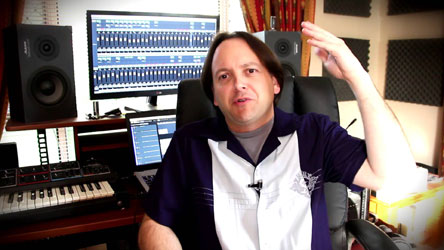 mwe3:
Are you saying that The Single Edits is a kind of best-of album
introduction to your music? You had said that you’re now streaming
your music mostly… so how widespread is music streaming and how
does streaming compare to downloading as far as ease or accessibility,
and are you trying to reach a new audience with this CD?
mwe3:
Are you saying that The Single Edits is a kind of best-of album
introduction to your music? You had said that you’re now streaming
your music mostly… so how widespread is music streaming and how
does streaming compare to downloading as far as ease or accessibility,
and are you trying to reach a new audience with this CD?
Ben Craven: Well, let’s be clear. Free music streaming
is great for listeners, terrific for the major shareholders who just
happen also to be the major labels, and a disaster for independent
artists who were relying on music sales for income. I’d resisted
making my music available on Spotify and Apple Music because of this
reason. However the market has spoken. It’s all over. Streaming
has won. Free music is now the order of the day. I cannot afford not
to be discoverable on Spotify any longer.
However, I’m not ready to admit yet that all my recorded music
has no commercial value. So I created this compilation specifically
for streaming, in the hope that it might encourage listeners to seek
out the longer versions of the songs and my other material. The original
title for this collection was actually An Introduction To Ben Craven.
It’s for casual listening. If anyone wants to go deeper, well
it’s not too hard to find me.
mwe3: You are not releasing the Single Edits on actual
CD but only digitally. Has the smart phone already replaced the audiophile
sound system of the future?
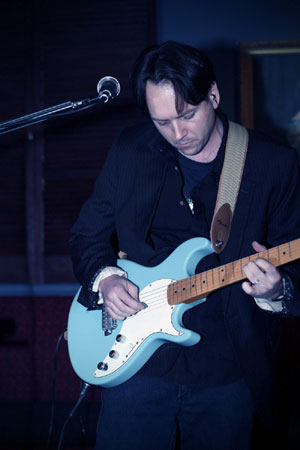 Ben Craven:
I didn’t feel it made any great commercial sense to manufacture
CDs for this release without any new material. However it is the first
time these songs have been made available in high definition 24-bit
96kHz lossless audio, and some of the older songs have been remixed
entirely, so they are certainly worthy of download. High resolution
audio is only a niche market unfortunately, so for all intents and
purposes downloads are also dead already now in the face of streaming.
Ben Craven:
I didn’t feel it made any great commercial sense to manufacture
CDs for this release without any new material. However it is the first
time these songs have been made available in high definition 24-bit
96kHz lossless audio, and some of the older songs have been remixed
entirely, so they are certainly worthy of download. High resolution
audio is only a niche market unfortunately, so for all intents and
purposes downloads are also dead already now in the face of streaming.
I think the ideal situation is to release music both as high definition
downloads and vinyl. Vinyl has made a small resurgence, at least enough
to drive up manufacturing costs and waiting times! I only recently
dug out my old vinyl collection and started listening to it again,
and I think I finally “get” it. It’s the ritual. It
has nostalgic value and creates new nostalgia. It’s a social
event. It has very little to do with technical sound quality. But
if I want to listen to perfect digital versions of the music, I can
also do that with downloads and not worry about the clicks and pops.
Smartphones with high quality headphones or earphones are great for
that. Strangely enough, the more smart phones and streaming take over,
the more I miss those old silver stacked audio components in chipboard
cabinets with glass doors. Hi-fi used to be exciting.
mwe3: You start off The Singles Edits with “Critical
Mass Part II” which is from Last Chance To Hear. Interesting
that you chose the instrumental section of the song as a complete
track on its own to start the album off. How did you get that tremolo
effect on the guitars like you are trying to channel your inner Hank
Marvin on “Critical Mass Pt. 2”? Even though, the guitar
sound morphs into Steve Howe territory!
Ben Craven: Oh, Hank is quite definitely an influence there,
along with Henry Mancini, John Barry and surf music in general. In
fact I even used the same pickups that Chris Kinman designed for Hank
to recreate his 1960s sound. I went for a very twangy Stratocaster
bridge sound going through an overdriven Vox amp. I think there’s
a stereo-panned tremolo effect as well. It’s a sound I love and
I try to sneak it into my songs wherever I can.
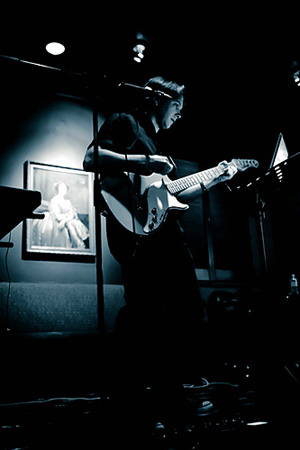 mwe3:
What changes if any did you make on “The Remarkable Man”?
Is it somewhat tighter and more condensed now? I forgot what you said
inspired that track although I already knew it’s John Barry inspired.
That’s your James Bond inspired track right? Last time you were
saying you wanted Tom Jones to sing it. I wonder if Tom got to hear
your song.
mwe3:
What changes if any did you make on “The Remarkable Man”?
Is it somewhat tighter and more condensed now? I forgot what you said
inspired that track although I already knew it’s John Barry inspired.
That’s your James Bond inspired track right? Last time you were
saying you wanted Tom Jones to sing it. I wonder if Tom got to hear
your song.
Ben Craven: Yes, “The Remarkable Man” is definitely
the ‘Bond’ song from Last Chance To Hear… Now
that you’ve reminded me, I maintain that Tom Jones would have
made the track sound perfect.
This particular edit of “The Remarkable Man” was created
well before the Last Chance To Hear album was released. I commissioned
a video for the track from Multimedia Milk in Sydney and figured if
I could shave a minute off the song, it would make everyone’s
lives easier. I cut down the intro and winced as I threw away half
of the guitar solo. But by the time I finished the edit they had already
completed the video for the longer version!
mwe3: The bandcamp pages for your albums are amazing to say
the least. What do you make of Bandcamp and how are they as a source
of revenue for musicians compared with other sites? What kind of system
do bandcamp use to play back the music?
Ben Craven: Bandcamp is one of the fairest sites for musicians.
They do take a percentage which is not unreasonable but they also
provide the complete infrastructure for downloads and commerce, plus
musicians get paid almost immediately after each sale. I can choose
whether or not to allow streaming for individual tracks, for a limited
or unlimited number of plays, make high definition downloads available,
provide immediate downloads with physical purchases, and so on.
CD Baby is also still one of the good guys and they can handle digital
distribution to every site out there as well as physical mail order.
So the infrastructure available to musicians to sell their music these
days is as good as it can be. The main problem, as it has always been,
is how to encourage people to discover your music in the first place.
And now another problem is how to encourage them to support you financially.
mwe3: “Ready To Lose” is a Bad Company style rocker
from Great & Terrible Potions. Did you consider that to
be a kind of single from the album? Is that about a self-defeating
prophecy about the music business? It does have a kind of Rabin-esque
flair to it. What are some of the key lyrics in “Ready To Lose”?
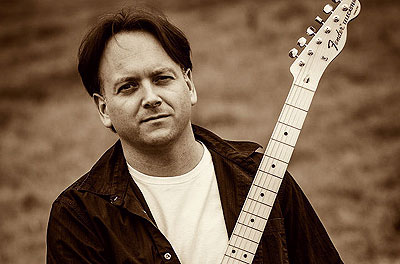 Ben Craven:
Yes, “Ready To Lose” was actually the prerelease single
from Great & Terrible Potions. It has a rather grim, or
empowering lyric, depending on how you see things. It was an admission
that I was a musical outsider and was never going to get my music
heard by doing the “right” things, like making it simpler,
releasing shorter EPs, begging industry bodies, attending conferences,
competing for showcases, following social media rules, etc…“I
knew the mantras inside and out.” So as long as I was resigned
to not being heard anyway, I was going to make exactly the music I
wanted to make, and if nobody was interested, well, so be it. “Nobody
saw me coming and nobody will see me leave.”
Ben Craven:
Yes, “Ready To Lose” was actually the prerelease single
from Great & Terrible Potions. It has a rather grim, or
empowering lyric, depending on how you see things. It was an admission
that I was a musical outsider and was never going to get my music
heard by doing the “right” things, like making it simpler,
releasing shorter EPs, begging industry bodies, attending conferences,
competing for showcases, following social media rules, etc…“I
knew the mantras inside and out.” So as long as I was resigned
to not being heard anyway, I was going to make exactly the music I
wanted to make, and if nobody was interested, well, so be it. “Nobody
saw me coming and nobody will see me leave.”
mwe3: “Aquamarine” from Great & Terrible
Potions, is another instrumental. Is that more in the classic
prog style and who would you say influenced you mostly in that style?
After hearing “Aquamarine” you might say that your music
is great as both vocal and instrumental rock too if only the fusion
guys would give you a chance!
Ben Craven: It’s hard to say where “Aquamarine”
came from. I wasn’t trying to channel anyone in particular. I
was just trying to make my own music sound competent. There were certain
elements I had wanted to try in that song, such as an Indian tamboura
drone, an acoustic guitar E-Bow loop, a tremolo Farfisa organ, a music
box, and of course a lead guitar line that could stand on its own.
They all seemed to work.
I am definitely more inclined to make instrumental music. Music for
me is an escape from reality and the literal. There’s nothing
that makes a song come crashing back to earth like a questionable
lyric. If I were a better player and could maintain people’s
attention spans for 40 minutes, like an early Mike Oldfield instrumental
album, I would. In fact, the majority of my last album, Last Chance
To Hear, was instrumental. But in my experience, audiences in
general seem to prefer some singing, some human focal point. Oh well…
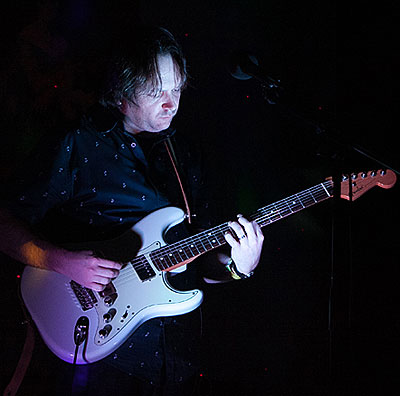 mwe3:
The Single Edits version of “Spy In The Sky Pt. 3”
brings William Shatner in much sooner on the track. This would make
a great single! For some reason, Shatner’s vocals sound much
more clear on The Singles Edits version. What did Billy Sherwood
think of the edit version? Shatner has always had one of the most
distinctive voices in pop culture history. When Billy recorded him
in L.A., did Shatner do his vocals over your track or was it a click
track or something like that?
mwe3:
The Single Edits version of “Spy In The Sky Pt. 3”
brings William Shatner in much sooner on the track. This would make
a great single! For some reason, Shatner’s vocals sound much
more clear on The Singles Edits version. What did Billy Sherwood
think of the edit version? Shatner has always had one of the most
distinctive voices in pop culture history. When Billy recorded him
in L.A., did Shatner do his vocals over your track or was it a click
track or something like that?
Ben Craven: I originally gave Billy Sherwood a fully completed
instrumental track with my guide vocal very low in the mix. Even I
was surprised by how gloriously “over the top” Mr. Shatner’s
vocals were, and I realize now that he had to compete with all my
instrumentation. Had I given him a click track, I imagine his performance
might have been more subdued! Which clearly wouldn’t have worked
as well. I would safely bet that Billy Sherwood has not had a chance
to hear this single version, given that he is now a fully occupied
member of YES.
mwe3: “The Great Divide” goes way back to your first
album Two False Idols. Do you think Two False Idols
got the listening it deserved? Was anything done mix-wise, post –facto
to “The Great Divide” to mark its place on The Singles Edits?
What is ‘the great divide’ in your mind, considering the
track was done about eight years ago now.
Ben Craven: The tracks from Two False Idols were completely
remixed for this project. I am still in the process of archiving all
the original multi-tracks from my albums and will eventually get around
to mixing them in high definition stereo and 5.1 surround. But those
tracks (“Great Divide”, “Captain Caper”, “Golden
Band”) were remixed first as an experiment for this project.
As for the Two False Idols album, it got as much listening
as possible for an independent release I put out myself with a meager
marketing budget and no experience. Which is, not a great amount!
I’m hopeful the remix down the track will draw more attention
to it.
“Great Divide” was inspired by a wonderful music instructor
I once had. The simple idea that no matter how far and wide we travel,
literally, intellectually or spiritually, there’s always a solid
foundation we can return to anytime we like.
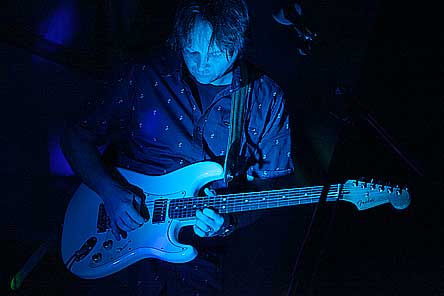 mwe3:
“Nobody Dies Forever” is an edit from the Great &
Terrible Potions CD. How does that one fit into The Single
Edits concept? Is that track the more pop side of your progressive
music track? With its Bond-like title, it sounds like it’s a
precursor track to Last Chance To Hear. Who would you say influenced
your guitar sound on that track?
mwe3:
“Nobody Dies Forever” is an edit from the Great &
Terrible Potions CD. How does that one fit into The Single
Edits concept? Is that track the more pop side of your progressive
music track? With its Bond-like title, it sounds like it’s a
precursor track to Last Chance To Hear. Who would you say influenced
your guitar sound on that track?
Ben Craven: That’s actually the same single edit that
appeared at the end of the Great & Terrible Potions album.
It’s Bond-like, but also has a hint of B-grade science fiction
with a Theremin buried under the slide guitar in the introduction.
There are deliberate nods to Bernard Herrmann, Henry Mancini and even
Jerry Goldsmith as I discovered later. I was absolutely going for
vintage twangy and fuzz guitar in that track but I’m sure I ended
up smoothing them over. The drums were originally a lot busier. They
were becoming an early Bill Bruford-esque tour de force at one point,
until I realized they were a distraction from the rest of the song.
mwe3: “No Specific Harm” is another is also from
Great & Terrible Potions. It’s one of the most rocked
out tracks you’ve ever made. Is it kind of neo-psychedelic? I
was going to say it sounds like a Strawberry Alarm Clock album track
that was made in 1968. How is the Single Edits version different
from the original?
Ben Craven: “No Specific Harm” is one of my favorites.
The full-length version combines an orchestral soundtrack, spooky
middle section and a huge solo at the end, yet it retains a very simple
verse-chorus structure. I had all sorts of fun adding the sound effects
that built up the thick, heavy sonic landscape. You can’t necessarily
hear them individually, but they add up. The lyrics twist a poem about
romantic love into a tale of revenge, jealousy and obsession.
The single version is probably best heard before experiencing the
album version. I think it works well on its own. It cuts out all the
sonic exposition and distills it down to the essential verses and
choruses with just a hint of flavor in the middle.
mwe3: “Captain Caper” and “Golden Band”
both go back to Two False Idols… That album was remixed
so were you able to get the right balance on both of these Single
Edits version? “Captain Caper” almost sounds like The
Bee Gees circa Odessa and “Golden Band” is very odd
too in a kind of McCartney-esque manner. What is the golden band?
(the Beatles?) Any fresh reflections on those two early tracks that
are both very poppy especially compared with the more seasoned prog
on Last Chance To Hear…?
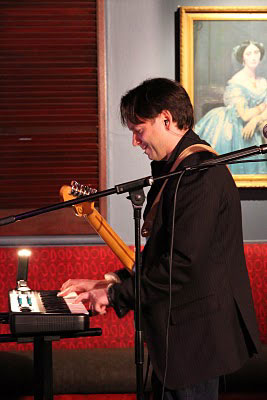 Ben
Craven: It’s very interesting that you call those tracks
“poppy” when they are in fact the most progressive tracks
from Two False Idols! I was still finding my feet, at a strange
junction between country rock and darker orchestrated music. These
two tracks in particular paved the way for the sorts of arrangements
that would follow on the subsequent albums.
Ben
Craven: It’s very interesting that you call those tracks
“poppy” when they are in fact the most progressive tracks
from Two False Idols! I was still finding my feet, at a strange
junction between country rock and darker orchestrated music. These
two tracks in particular paved the way for the sorts of arrangements
that would follow on the subsequent albums.
It might be surprising to discover that “Golden Band” is
achingly literal. I had some friends at the time who found themselves
in strained marriages, basically in denial that their relationships
had become toxic and were effectively over. The song tried to explore
why they kept persevering. There is indeed some McCartney-esque wordplay
in the lyrics!
mwe3: “Revenge Of Doctor Komodo” closes out the album
with a kind of prog-boogie shuffle. That has an interesting Keith
Emerson vibe. As you say, it’s an Emersonian tribute. Did you
want to end The Single Edits on a kind of fun, upbeat groove
with a track that you describe as “progabilly”?
Ben Craven: I had terrific fun with “Revenge Of Dr Komodo”.
It actually borrows the main 4-note figure from “Critical Mass”,
not that anyone has noticed, and becomes a rockabilly tune set to
a simple diminished-fifth power chord.
I had toyed with ending Last Chance To Hear with this track,
but instead went for the big multiple climaxes of “Last Chance
To Hear Part 2”. So this was a good opportunity to end The
Single Edits with a bang.
mwe3: Is The Single Edits a final appraisal of this
music or do you this as a template moving forward on your forthcoming
music or are you looking to going back to multipart pieces of music,
that is more thematic based music? Either way, can a soundtrack album
be far behind?
Ben Craven: The Single Edits is first and foremostly
meant as an introduction to my music. It’s an oddity and I imagine
it would be difficult staying disciplined and keeping songs under
4 minutes in real life! If anything, the next album will end up being
even more pretentious than the last one. I think the opening track
is about 15 minutes long at this stage. Clearly I would love to do
soundtrack work. I see it as the only way forward for developing any
sort of musical career. But in the meantime, I’m having great
fun pretending to write soundtracks.
 mwe3:
Looks like progressive rock has kind of pinnacled out a bit with so
many of the original pioneers leaving for the next world. Do you see
this as a warning sign or a reason to double down and continuing onward?
Are you up for the challenges and do you feel you can surpass yourself
musically again?
mwe3:
Looks like progressive rock has kind of pinnacled out a bit with so
many of the original pioneers leaving for the next world. Do you see
this as a warning sign or a reason to double down and continuing onward?
Are you up for the challenges and do you feel you can surpass yourself
musically again?
Ben Craven: It is depressing to witness this era coming to
a close, I think. So many of my favorite musicians are either dying
or struggling to maintain their abilities as they get older. I can’t
really guess what will happen after all this, but I suspect tribute
bands will become even more popular. But my music has always been
made and continues to be made in a bubble. It was never intended for
any particular audience other than myself. I always hope that other
people will enjoy it and am incredibly grateful when they do. But
I’ll be trundling along regardless.



